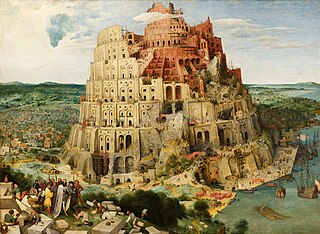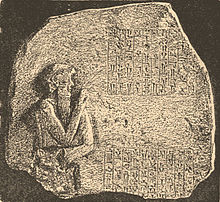The Book of Genesis is the first book of the Hebrew Bible and the Christian Old Testament. Its Hebrew name is the same as its first word, Bereshit. Genesis purports to be an account of the creation of the world, the early history of humanity, and the origins of the Jewish people.

Hammurabi, also spelled Hammurapi, was the sixth Amorite king of the Old Babylonian Empire, reigning from c. 1792 to c. 1750 BC. He was preceded by his father, Sin-Muballit, who abdicated due to failing health. During his reign, he conquered the city-states of Larsa, Eshnunna, and Mari. He ousted Ishme-Dagan I, the king of Assyria, and forced his son Mut-Ashkur to pay tribute, bringing almost all of Mesopotamia under Babylonian rule.

The Tower of Babel is an origin myth and parable in the Book of Genesis meant to explain the existence of different languages and cultures.

Abraham ben Meir Ibn Ezra was one of the most distinguished Jewish biblical commentators and philosophers of the Middle Ages. He was born in Tudela, Taifa of Zaragoza.

Sefer haYashar is a medieval Hebrew midrash, also known as the Toledot Adam and Divrei haYamim heArukh. The Hebrew title "Sefer haYashar" might be translated as the "Book of Righteousness". but it is known in English translation mostly as The Book of Jasher following English tradition. Its author is unknown.

Esau is the elder son of Isaac in the Hebrew Bible. He is mentioned in the Book of Genesis and by the prophets Obadiah and Malachi. The story of Esau and Jacob reflects the historical relationship between Israel and Edom, aiming to explain why Israel, despite being a younger kingdom, dominated Edom. The Christian New Testament alludes to him in the Epistle to the Romans and in the Epistle to the Hebrews.

Nimrod is a biblical figure mentioned in the Book of Genesis and Books of Chronicles. The son of Cush and therefore the great-grandson of Noah, Nimrod was described as a king in the land of Shinar. The Bible states that he was "a mighty hunter before the Lord [and] ... began to be mighty in the earth". Some later (non-biblical) traditions, interpreting the story of Jacob's dream in the Bible, identified Nimrod as the ruler who had commissioned the construction of the Tower of Babel or of Jacob's Ladder, and that identification led to his reputation as a king who had been rebellious against God.

Asher, in the Book of Genesis, was the younger of the two sons of Jacob and Zilpah, and Jacob's eighth son overall. He was the founder of the Israelite Tribe of Asher.

Chedorlaomer, also spelled Kedorlaomer, is a king of Elam mentioned in Genesis 14. Genesis portrays him as allied with three other kings, campaigning against five Canaanite city-states in response to an uprising in the days of Abraham.
Ashur was the second son of Shem, the son of Noah. Ashur's brothers were Elam, Arphaxad, Lud, and Aram.
The Book of Jasher, which means the Book of the Upright or the Book of the Just Man, is a lost book mentioned in the Hebrew Bible, often interpreted as a lost non-canonical book. Numerous forgeries purporting to be rediscovered copies of this lost book have been written. A different interpretation identifies it as a reference to the Pentateuch, specifically the Book of Genesis, an interpretation which is notably favored by the Jewish scholar Rashi in his commentary on the Hebrew Bible.
Eliezer was the name of at least three different individuals in the Hebrew Bible.
Arioch appears in Genesis 14 as the name of the King of Ellassr who participated in the Battle of Siddim. Led by Chedorlaomer, the four kings Amraphel, Arioch, Chedorlaomer, and Tidal engaged in a punitive expedition against five kings of Canaan who rebelled against Chedorlaomer, Bera of Sodom, Birsha of Gomorrah, Shinab of Admah, Shemeber of Zeboim, and Zoar of Bela. The same story is also mentioned in the Book of Jubilees, where Arioch is called "king of Sellasar". According to Genesis Apocryphon, Arioh was king of Cappadocia.
In the Old Testament, Tidal is a king of Goyim. In the Book of Genesis (14:1), he is described as one of the four kings who fought Abraham in the Battle of Siddim.

In the Hebrew Bible, Melchizedek was the king of Salem and priest of El Elyon. He is first mentioned in Genesis 14:18–20, where he brings out bread and wine and then blesses Abram, and El Elyon or "the Lord, God Most High". Abram was returning from pursuing the kings who came from the East and gave him a "tenth of everything".
Shuah is the name of one of four minor Biblical figures. It is sometimes used as the name of a fifth. Their names are different in Hebrew, but they were all transliterated as "Shuah" in the King James Version.
Allusions in rabbinic literature to the biblical character Simeon, son of Jacob, contain various expansions, elaborations and inferences beyond what is presented in the text of the Bible itself.

The Battle of the Vale of Siddim, also often called the War of Nine Kings or the Slaughter of Chedorlaomer, is an event in the Hebrew Bible book of Genesis 14:1–17 that occurs in the days of Abram and Lot. The Vale of Siddim was the battleground for the cities of the Jordan River plain revolting against Mesopotamian rule.
Tishdal was a Hurrian ruler from the Zagros mountains. According to David Rohl, he is identifiable with Tidal, king of Goyim from the Book of Genesis, 14:1. The word goyim in Biblical Hebrew can be translated as "nations" or "peoples" although some Bible commentaries suggest that in this verse it may instead be a reference to the region of Gutium. Tidal was one of the four kings who fought Abraham in the Battle of the Vale of Siddim.

Ibal pi’el II was a king of the city kingdom of Eshnunna in ancient Mesopotamia. He reigned c. 1779–1765 BC).











